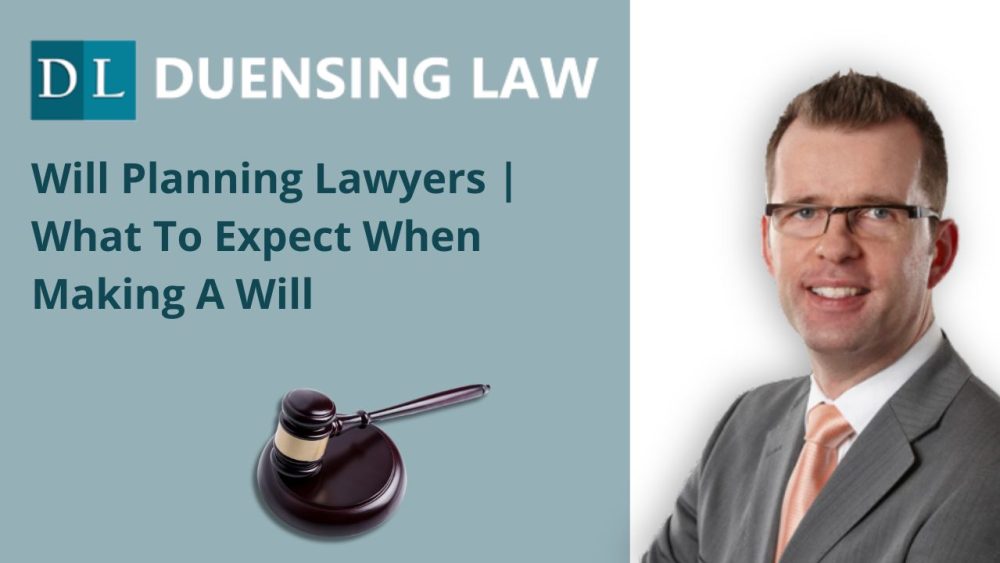When you hire will planning lawyers to prepare your Will, you might be overwhelmed thinking about where to start and what to expect. Here, we explain what to expect when you hire Duensing Law to prepare your Will.
Initial phone call or video call
Having an initial phone or video conference with our lawyers is the first step. Our lawyers will ask you some basic questions about yourself. Our lawyers will want an overview of your circumstances to determine how we can assist you. However, you typically do not need to go into considerable depth at this stage. You are free to ask any questions regarding our qualifications and expertise, our will-drafting procedure, costs, and payment methods during this conversation.
Ask us what the next steps are if you want to work with us. We will send you a questionnaire and/or a retainer agreement.
Retainer Agreement
A retainer agreement serves to clearly outline the terms of the contract between you and our lawyers and may contain the following:
- A breakdown of the tasks we will perform
- An explanation of our rates and billing procedures
- Our lawyer’s confidentiality responsibilities.
A retainer fee may also be requested in the retention agreement. To guarantee payment for our services, Lawyers ask for a retainer fee; this can be considered an advance payment for the work that will be done. The retainer fees will be deposited into a separate account. We cannot claim the money until we have completed the work and sent you an invoice.
Before signing, please ask us any questions to clarify anything unclear in the retainer agreement.
We may also want a copy of your government photo ID and contact details for our records as part of the retainer process.
Questionnaire
In addition to the information you provide during the initial phone contact, then we will email you a questionnaire to complete that may include the following:
- Information about your relationship status, such as your spouse or partner’s name and birthdate (and any ex-spouses/partners)
- Your children’s names, ages, and other information
- Information regarding your previous estate planning documents, such as wills, powers of attorney, and health care directives
- Information about any separation or prenuptial agreements you may have
- Details on your possessions and obligations
Design Meeting
We will then schedule a design consultation with you once you have finished the questionnaire. You can get ready by thinking about the following:
- Who should you designate as the executor or executor?
- Who should you designate as your children’s guardian or guardians?
- Do you have any particular guidelines for your pets?
- What are your preferences for the funeral
- Whether you wish to leave certain contributions to charities or people
- How you wish to divide the remainder (the majority) of your estate
- How you wish to handle allocating assets to beneficiaries who are minors or young adults
- Who should you choose as your alternate lawyer and property and personal care lawyer?
The purpose of the questionnaire and the meeting/call is to assist us in obtaining all the information required to draft your will.
Document preparation and review
Our lawyers will draft the documents for you once they have all the information required to prepare your will and any other estate planning documents you need.
This process can range from a few days to weeks. The complexity of your case and our current schedule will determine how long it takes. To get a sense of when you might hear back from us, please ask us for an indication of timing beforehand.
You will have the chance to examine and ask questions about the documents after we have prepared them. Take your time; it’s important to read these documents to ensure you understand them thoroughly and that all the information is accurate, including name spelling. Legal jargon is used in some of the documents; therefore, if something is unclear, don’t be hesitant to ask questions.
Signing Meeting
Signing the will and powers of attorney in front of two witnesses is the final step. Usually, this is carried out in our office.
Each witness must sign the will after the will-maker has done so. Additionally, it is customary to have both witnesses and the will-maker initial each page. The original copy of your will becomes your formal Last Will and Testament, and you will only sign one copy. Additionally, we will draft and commission an Affidavit of Execution in the format required.
In Ontario, Wills can now be observed remotely. In-person and remote witnessing have rather distinct regulations. Our lawyers will decide whether remote witnessing is suitable in your particular case.
Duensing Law avoids a one-size-fits-all strategy because we understand that every client has unique circumstances and solutions. You receive a thorough estate plan that satisfies your needs and a professional assessment with our assistance. Call 416-601-4769 to speak with one of our will planning lawyers today.



Comments are closed.